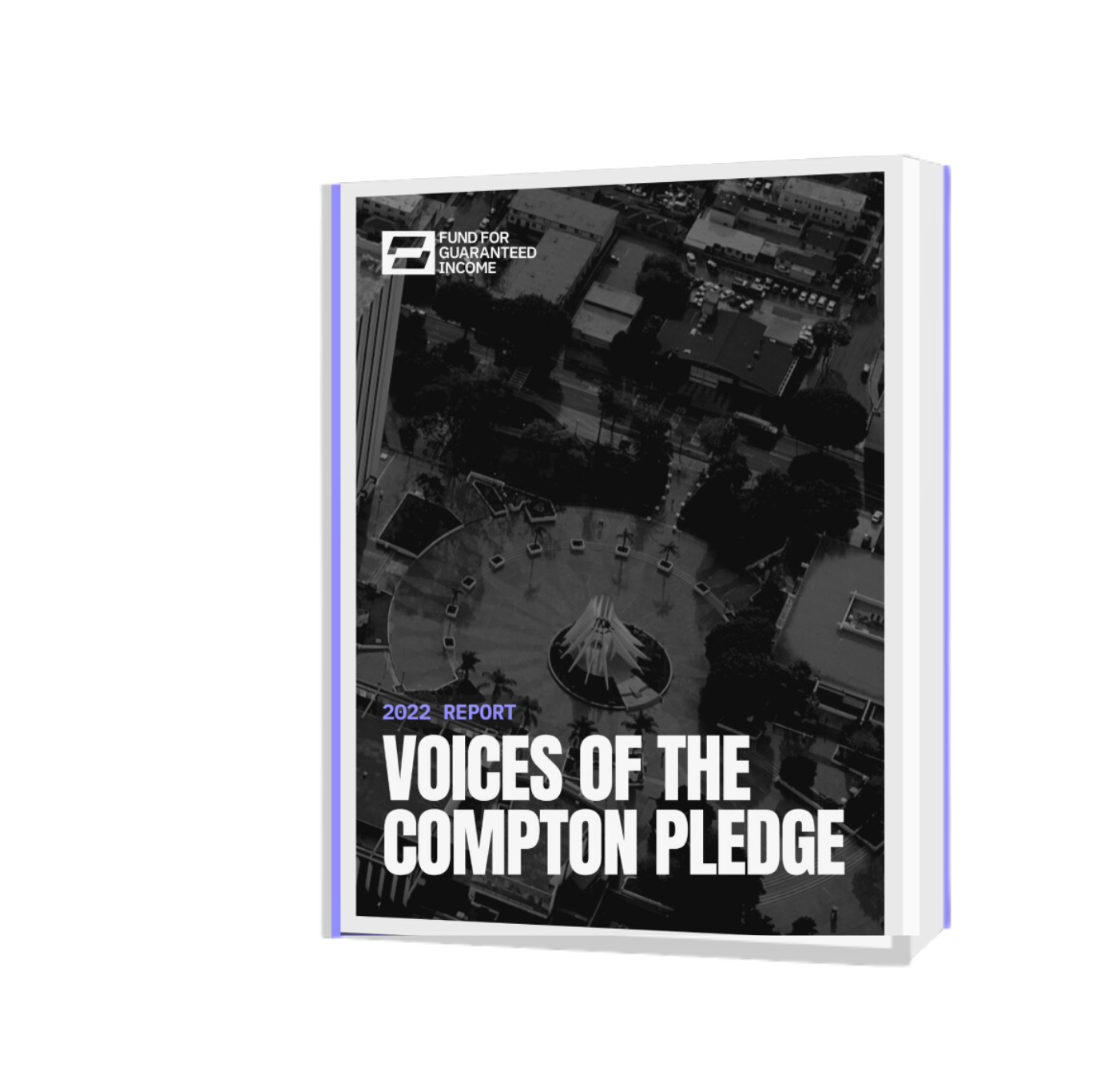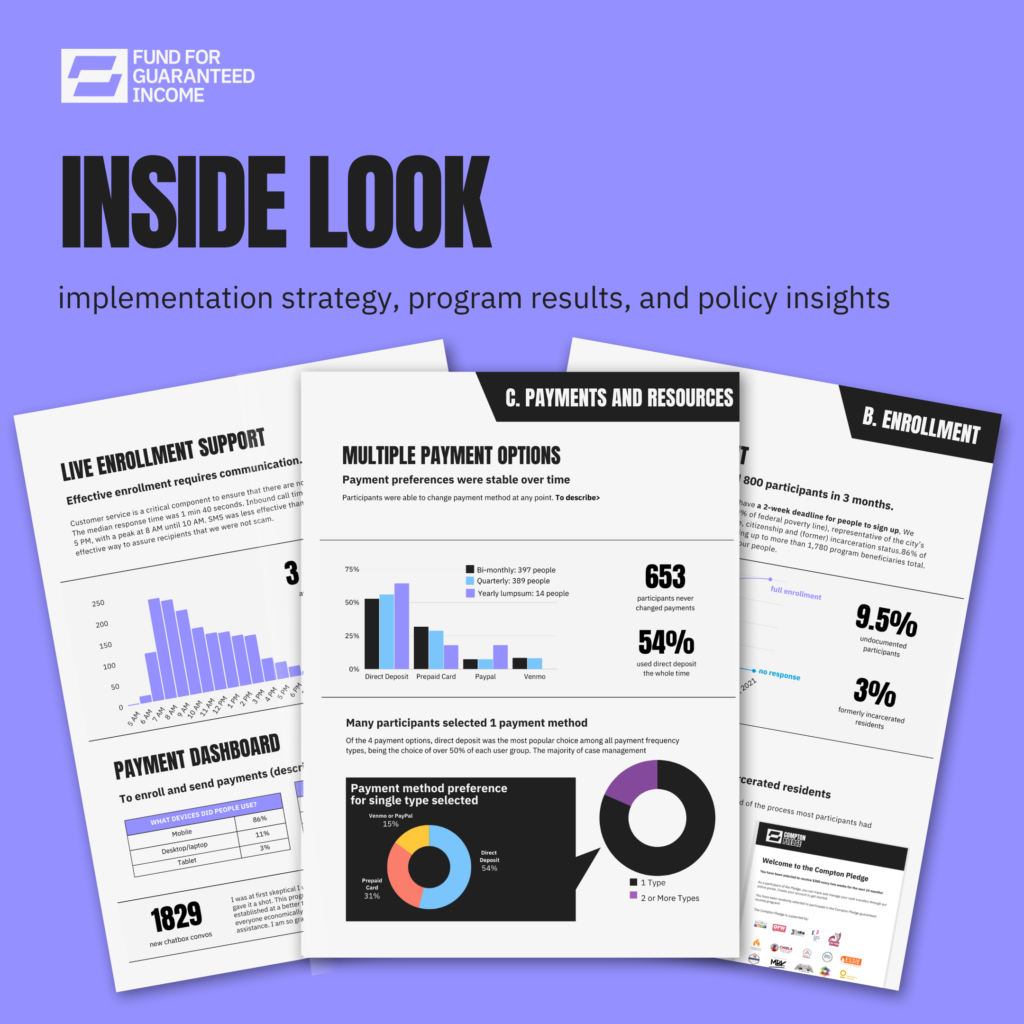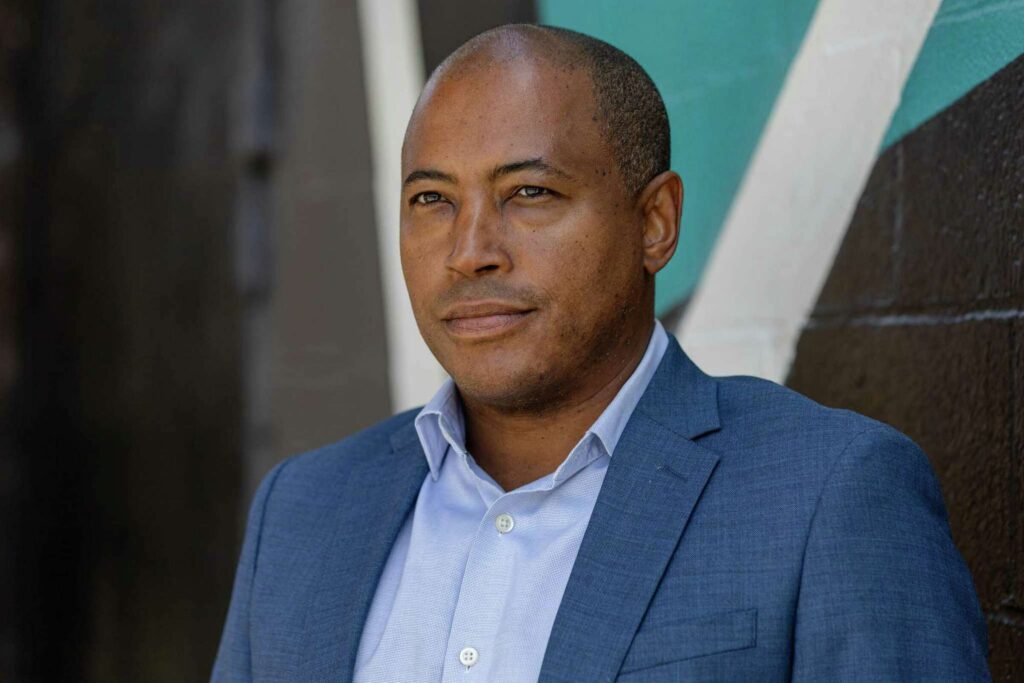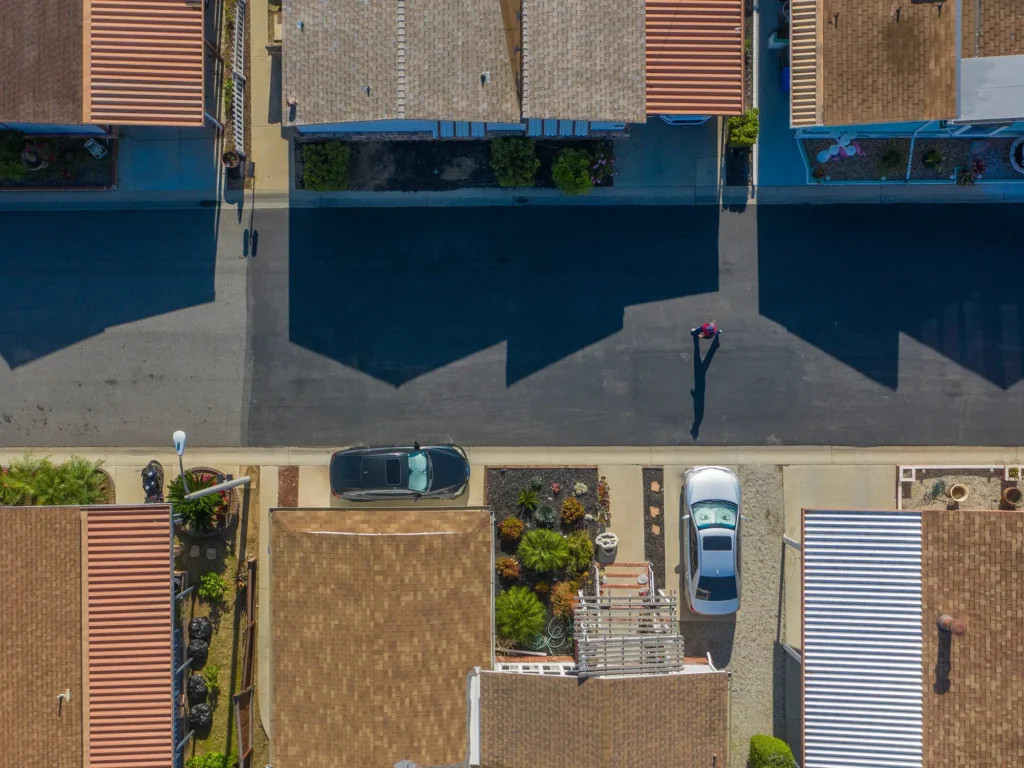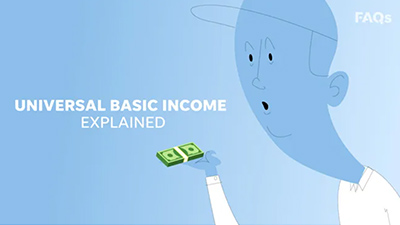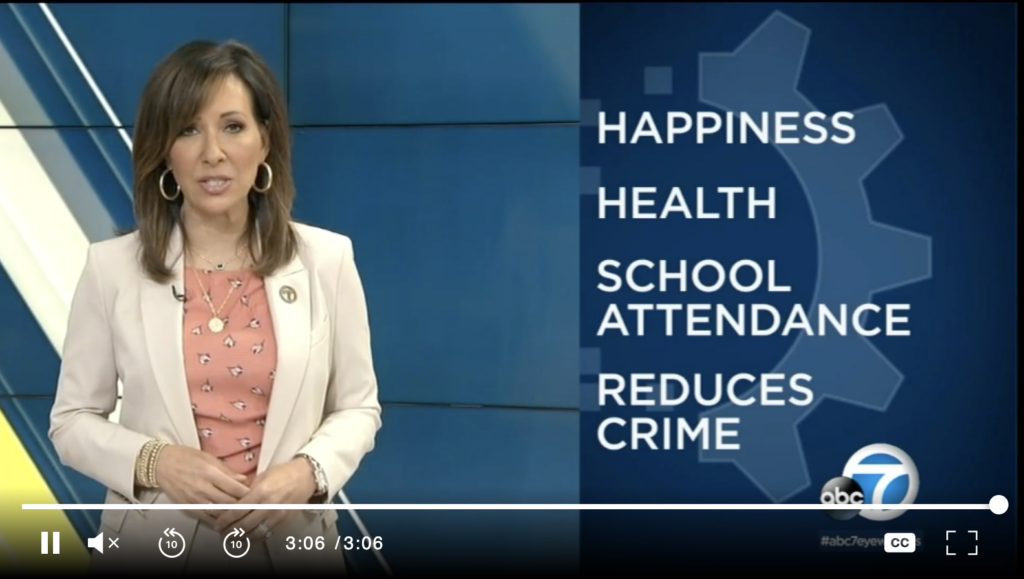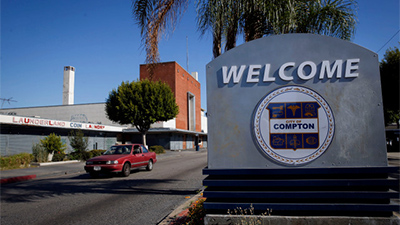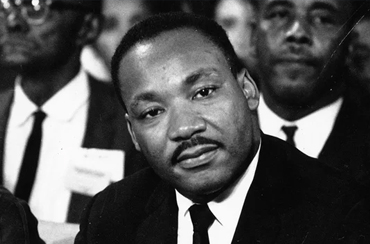REPORTS
MEDIA TOOLKIT
PRESS RELEASES
For media inquiries or access to older press releases please visit F4GI.org or email [email protected]
FREQUENTLY ASKED QUESTIONS
- The Compton pledge is a landmark guaranteed income initiative that will distribute recurring cash relief to low-income residents for 2 years, starting in late 2020.
- The Compton Pledge will be the largest city-based guaranteed income pilot in the US, and will harness the power of unconditional cash transfers in service of racial and economic justice.
- The Pledge is built by a broad coalition led by Mayor Aja Brown, the Fund for Guaranteed Income (F4GI), the Jain Family Institute (JFI) and local and national leaders that serve marginalized communities and justice movements across Compton and the US.
- Unbanked Comptonians will be provided with no-cost financial services through a new online platform, the first of its kind in US guaranteed income initiatives.
- Ambitious in its scale and design, the Pledge aims to inform policies at the state and federal level.
- A guaranteed income is a type of cash transfer program that provides continuous, unconditional cash payments to individuals or households. A guaranteed income differs from other social safety net policies by providing steady, predictable cash to spend however the recipient sees fit, without limitations.
- Our vision of a guaranteed income is to supplement, not replace, the existing social safety net as a tool for protecting livelihoods and enabling economic and racial justice.
- Residents of Compton who receive cash will be randomly chosen from the most accurate list of residential addresses in Compton, with input from the city and many community-based organizations. All low-income residents of Compton are eligible for consideration, including the undocumented, the formerly incarcerated, and those otherwise ineligible for existing welfare programs. Residents need not apply or submit any personal information to be considered.
- This method of enrollment will allow the Compton Pledge to test more inclusive and effective mechanisms for cash transfer delivery while supporting the 1 in 4 who are unbanked, the formerly incarcerated who are denied welfare benefits, and undocumented individuals who are denied the right to a fair, minimum wage.
- Only one member of each household will be eligible to receive the benefit.
- The exact amounts received by each participant will vary, but each participant will receive at least several hundred dollars, with greater amounts received by parents with multiple children. The frequency of distribution will also vary but participants will be informed at the outset about the timing of their expected payments so that they may plan accordingly.
- A social security number (SSN) or ITIN is not required to receive a cash payment through the Compton Pledge; residential addresses in Compton are the primary form of identifying information. In addition, by working directly with community-based organizations that serve the undocumented, Compton Pledge aims to build trust in the program and ensure individuals can receive the benefit regardless of legal status.
- Guaranteed income, and a related suite of cash transfer policies, have been tested, studied, and implemented throughout the US and internationally. In the US, the largest long-term cash transfer policy is the Alaska Permanent Fund—a yearly transfer to residents of Alaska (see evidence from Alaska here). The Stockton Economic Empowerment Demonstration, in California, and the Magnolia Mothers Trust, in Mississippi, are two recent pilots that, like the Compton Pledge, center autonomy for participants. The Mayors for a Guaranteed Income Coalition, launched in summer 2020, is advocating for more pilots and policies in the US. Additional emerging pilots include the cities of Newark, St. Paul, Pittsburgh, and Los Angeles, among others.
- See this map and article for more information about existing guaranteed income policies domestically and internationally.
- The Compton Pledge will be among the largest city-based guaranteed income initiatives in the US, reaching more people than any other comparable pilot program. The Pledge is also designed explicitly to harness the power of unconditional cash transfers in service to racial and economic justice. Another pilot that has modeled this focus is the Magnolia Mother’s Trust, a guaranteed income to 20 Black women in Jackson, MS in 2018.
- Moreover, the scale of this guaranteed income initiative allows researchers to understand with even unprecedented statistical precision the size and frequency of cash transfers that best benefit recipients —particularly, given the unique composition of Compton, members of marginalized groups and BIPOC. It aims to produce evidence for long term policies that promote financial inclusion through a digital platform for receiving benefits.
- There are two categories of success in this pilot. The first is that the pilot makes a positive difference in the lives of the hundreds of individual participants. Specifically, we seek to measure the economic, social, and psychological impacts of economic insecurity with a goal of improving dignity of life for participants. The attendant research study will track these metrics through survey data. In addition to receiving the cash, participants will also have access to existing services to build their economic security.
- The second category of success is that this pilot produces research which helps to inform the design of future guaranteed income policies at local, state, and federal levels. Through the pilot, we can make progress towards understanding the efficacy of specific cash transfer mechanisms, the best means for identifying and enrolling historically excluded populations, and the impact that cash transfer magnitude has on outcomes—all of which will be critical in informing pilots and government-backed policies launched over the coming years across the country. Narrative change is one component in moving toward such policies, and so we hope to build off the notable work that SEED in Stockton and Magnolia Mother’s Trust in Jackson, among others, have done in this regard, with policy change as the ultimate measure of success.
- The long-term vision for guaranteed income is a scaled city-level policy that would reach a broader share of Compton’s residents than the initial recipients.
- We believe this pilot will be critical to building a case for the broader implementation of this policy, in Compton as well as other places. While there is no specific time frame for this expansion, it is in service of this longer term vision that we are hosting this pilot and gathering evidence to make the case for guaranteed income as a sustainable city policy.
- While this is the subject of ongoing research and debate around policy priorities, universal guaranteed income policy at the municipal, state, or federal level can potentially be funded through a carbon tax, a wealth tax, an increase in progressive income tax, a budget reallocation, a VAT tax or dividend from some kind of fund, like natural resources, casino revenue, or a sovereign or social wealth fund.
- Pilots such as this one build the case and political momentum for structuring a program that can be financed progressively to protect the lives and basic livelihoods of the most vulnerable, many of whom are stuck in poverty due to system failures and long standing economic exclusion.
- Previous research shows that low-income beneficiaries of a cash transfer program use that money to pay bills, to invest in further job training or education, or to cover other basic needs. Empirical evidence refutes the myth that cash transfers decrease the motivation to work or that people tend to spend that income on “temptation goods” such as controlled substances.
- Since February 2019, when the Stockton Economic Empowerment Demonstration (SEED) program began, people receiving the money have on average spent nearly 40% of it on food. About 24% went to sales and merchandise, which include places like Walmart and discount dollar stores that also sell groceries. Just over 11% went to utility bills, while more than 9% went to auto repairs and fuel.
- Giving people money can address a wide cross-section of issues related to cyclical poverty. It is the most direct way to abolish poverty, and it has been proven to do so while also addressing related issues of health, education, housing stability, and crime. This is not a band-aid solution, but rather a plan to invest in the dignity and agency of Compton residents experiencing poverty. As research has shown, the welfare impacts of a guaranteed income are widespread, including positive health outcomes, higher educational achievement, lower crime rates, and, in some cases, even lower spending on temptation goods like drugs and alcohol. A guaranteed income therefore invests in the dignity and future economic security of Compton residents.
IN THE NEWS
Constanza Hevia H./Special to The Chronicle
San Francisco Chronicle — April 23, 2022
David McNew/Getty Images
Business Insider — November 23, 2021
LA Sentinel / Courtesy Mayor Aja Brown
LA Sentinel — November 5, 2020
USA TODAY
USA TODAY — October 20, 2020
Jason Armond / Los Angeles Times
Los Angeles Times — October 19, 2020
ABC7
ABC7 — March 26, 2021
Justin Bieber / Twitter
FYI Music News — April 7, 2021
News One
News One — March 27, 2021
Patrick T. Fallon/Bloomberg via Getty Images
CBS Local — October 19, 2020


